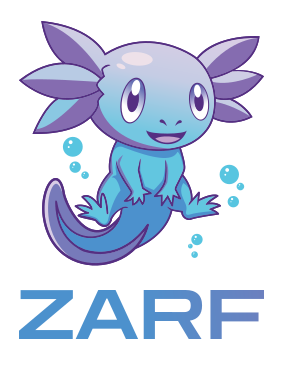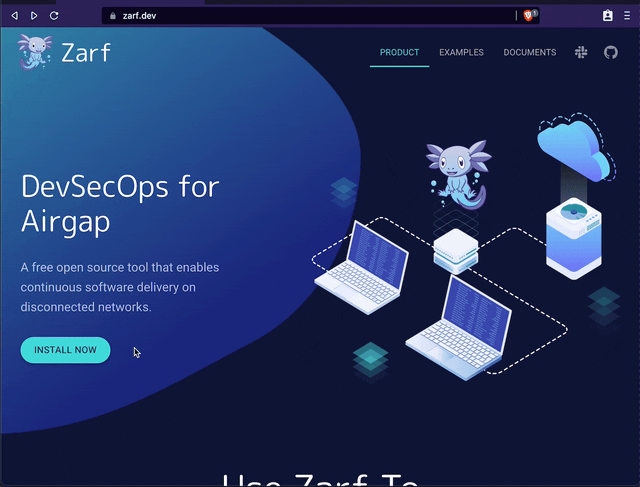Zarf eliminates the complexity of air gap software delivery for Kubernetes clusters and cloud-native workloads using a declarative packaging strategy to support DevSecOps in offline and semi-connected environments.
- 💸 Free and Open-Source. Zarf will always be free to use and maintained by the open-source community.
- ⭐️ Zero Dependencies. As a statically compiled binary, the Zarf CLI has zero dependencies to run on any machine.
- 🔓 No Vendor Lock. There is no proprietary software that locks you into using Zarf. If you want to remove it, you can still use your Helm charts to deploy your software manually.
- 💻 OS Agnostic. Zarf supports numerous operating systems. A full matrix of supported OSes, architectures, and feature sets is coming soon.
- 📦 Highly Distributable. Integrate and deploy software from multiple secure development environments, including edge, embedded systems, secure cloud, data centers, and even local environments.
- 🚀 Develop Connected, Deploy Disconnected. Teams can build and configure individual applications or entire DevSecOps environments while connected to the internet. Once created, they can be packaged and shipped to a disconnected environment to be deployed.
- 💿 Single File Deployments. Zarf allows you to package the parts of the internet your app needs into a single compressed file to be installed without connectivity.
- ♻️ Declarative Deployments. Zarf packages define the precise state for your application, enabling it to be deployed the same way every time.
- 🦖 Inherit Legacy Code. Zarf packages can wrap legacy code and projects - allowing them to be deployed to modern DevSecOps environments.
- Automate Kubernetes deployments in disconnected environments
- Automate Software Bill of Materials (SBOM) generation
- Build and publish packages as OCI image artifacts
- Provide a web dashboard for viewing SBOM output
- Create and verify package signatures with cosign
- Publish, pull, and deploy packages from an OCI registry
- Powerful component lifecycle actions
- Deploy a new cluster while fully disconnected with K3s or into any existing cluster using a kube config
- Built-in Git server with Gitea
- Built-in Docker registry
- Builtin K9s Dashboard for managing a cluster from the terminal
- Mutating Webhook to automatically update Kubernetes pod's image path and pull secrets as well as Flux Git Repository URLs and secret references
- Builtin command to find images and resources from a Helm chart
- Tunneling capability to connect to Kubernetes resources without network routing, DNS, TLS or Ingress configuration required
- Customizable variables and package templates with defaults and user prompting
- Composable packages to include multiple sub-packages/components
- Component-level OS/architecture filtering
https://www.youtube.com/watch?v=WnOYlFVVKDE
Follow the instructions at https://docs.zarf.dev/getting-started/.
To discover more about Zarf and explore its features, please visit docs.zarf.dev. The documentation offers in-depth insights on:
- installation
- packages
- components
- actions
- variables
- SBOMs
- and more!
Using Zarf in GitHub workflows? Check out the setup-zarf action. Install any version of Zarf and its init package with zero added dependencies.
Join us on the Kubernetes Slack in the #zarf channel or the #zarf-dev channel! Our active community of developers, users, and contributors are available to answer questions, share examples, and find new ways use Zarf together!
We are so grateful to our Zarf community for contributing bug fixes and collaborating on new features:
Made with contrib.rocks.
Check out our Contributor Guide to learn more about how to set up your development environment and begin contributing. We also recommend checking out our architectural diagram.
To dive deeper into the tech, you can read the Nerd Notes in our Docs.
Early Zarf research and prototypes were developed jointly with United States Naval Postgraduate School research you can read here.
We would also like to thank the following awesome libraries and projects without which Zarf would not be possible!















